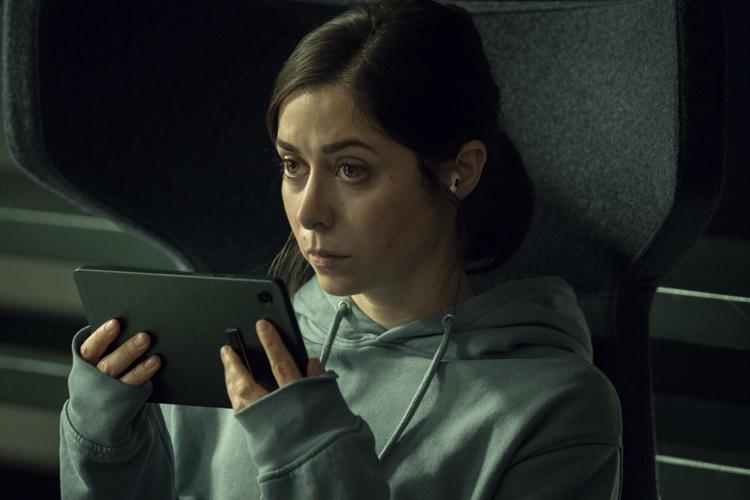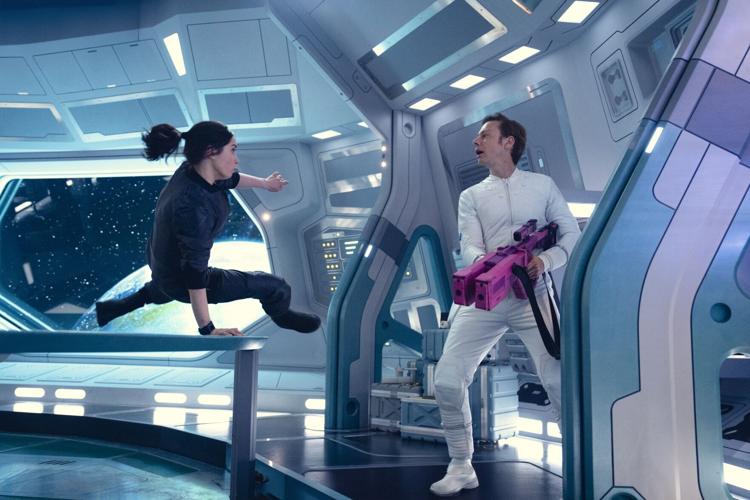Cristin Milioti felt like she had been inside a martini shaker after filming scenes in ŌĆ£USS Callister: Into Infinity.ŌĆØ
ŌĆ£It was a lot like falling out of a hospital bed,ŌĆØ she explains. ŌĆ£It was very physical ŌĆ” but I like that.ŌĆØ
In the latest edition of the Emmy-winning ŌĆ£Black MirrorŌĆØ installment, she had intense stunts and action sequences on a couple of levels. ŌĆ£I can run and stuff but IŌĆÖm not a trained stunt person,ŌĆØ Milioti says. The stunt coordinator ŌĆ£was very helpful at choreographing it based on our skill level.ŌĆØ
One scene, for example, took three hours of rehearsal. The result? An amazing display of action on screen.
In the sequel, Milioti returns as Nanette Cole, a programmer who has volunteered to track rogue players in an immersive virtual reality-based game. Because it exists on several levels, the story required her to play a clone as well as the original character. For newcomers, it may sound confusing, but the original paid homage to ŌĆ£Star Trek,ŌĆØ video games and the cultures that surround them.
People are also reading…
When the original was released in 2017, it was hailed as a crowning achievement of ŌĆ£Black MirrorŌĆØ and a likely candidate for reboot. A series was pondered but the 2023 SAG-AFTRA strike derailed the idea, and the plot was reworked for ŌĆ£Into Infinity.ŌĆØ
Going back to the ship, Milioti says, was ŌĆ£really trippy. It was so cool, but I did feel like I was in an active d├®j├Ā vu simulation.ŌĆØ
Sets were eerily similar, according to co-star Jimmi Simpson. ŌĆ£You donŌĆÖt ever have that. You also donŌĆÖt have (time freezing). WeŌĆÖre all just the same people, just eight years later.ŌĆØ
The new edition emphasizes further developments in the gaming world and points a finger at tech billionaires ŌĆ£who are making huge choices that negatively impact the rest of the world, solely for greed or an ego pet,ŌĆØ Simpson says.
Both actors got to play a variety of emotions as their real/clone characters. Simpson likens it to therapy. His character, he says, discovers heŌĆÖs fallible ŌĆ£and heŌĆÖs being crushed from a force that is more powerful than him for the first time. ThatŌĆÖs when he has realized, ŌĆśOh, god, IŌĆÖm deeply flawed.ŌĆÖ HeŌĆÖs getting a sense that that connection is what life is about.ŌĆØ
The story within a story, Milioti says, gave writer Charlie Brooker a chance to comment on reality television before characters blow someone apart. ŌĆ£It reflects the callousness that can be within anonymity online,ŌĆØ she says. ŌĆ£Or like these tech billionaires who are making these choices that affect millions and millions of people and they have no thought about it. I like how he mines the humor in that with this.ŌĆØ
Director Toby HayneŌĆśs energy, Simpson says, ŌĆ£helped us feel like (we were at) summer camp. ThereŌĆÖs a very childlike, almost counselor quality to him.ŌĆØ
If he said, ŌĆ£Go jump in the lake,ŌĆØ Simpson says, ŌĆ£weŌĆÖd go jump in the lake. It keeps us feeling young and off balance.ŌĆØ
At the end of the first film, MiliotiŌĆÖs character had power and confidence. ŌĆ£SheŌĆÖs discovered this new reserve within herself.ŌĆØ In the new edition, ŌĆ£sheŌĆÖs at her witsŌĆÖ end and sheŌĆÖs really bad at this job. SheŌĆÖs retreating more and more into herself and becoming more and more meek.ŌĆØ
The virtual world version, however, ŌĆ£is constantly ready for something to burst through the wall.ŌĆØ
The film was fun, Simpson says, even though the actors were playing ŌĆ£our worst traits come to life.ŌĆØ
That dual-identity premise worked, he adds, because the two had chemistry. ŌĆ£We share a caffeine dependency and a love of theater and we kind of just let it happen.ŌĆØ
"USS Callister: Into Infinity" airs on Netflix.┬Ā






















